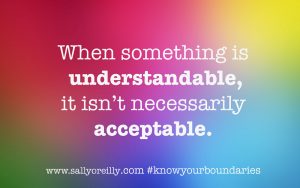Where do we draw the line when people treat us poorly?
This is a quandary faced by many. Particularly if we have a fear of hurting people or being rejected by them. We like to be liked. We need to be liked. But at what cost?
We tend to ruminate a lot on questions like “Why do people mistreat me? How can I make them change? What can I do differently?”
Being liked and keeping things “friendly” can be so important to us that we unintentionally place ourselves in dangerous situations. This brings up some difficult questions – like how we choose (yes, we do, at some level) people that are abusive, how we manage our feelings once abused, how we teach people to treat us badly, and how we teach them to treat us better.
When and how do we stop allowing people to treat us badly?
[bctt tweet=”What we allow continues #selfcare #boundaries #relationships” username=”psychosal” prompt=”tweet to another lovely person”]
Many of us are highly empathic people. Research is showing us that the longer we survive as a race and educate ourselves about each other, the kinder we are becoming. In fact, it seems that our propensity to be compassionate is what has led to our survival as a species. It may not seem like that because of how we tend to focus on the negative, but it’s true. We are happier, healthier, wealthier, and nicer than we’ve ever been. (Visit Gapminder for some fascinating stats and videos if you’re interested!)
The pitfall of our increased ability to empathise though, is that it is exactly how and why a lot of us get stuck in difficult relationships. In our relatively new found ability to understand the poor behaviour of others we can inadvertently allow that behaviour to continue.

Take the friend who ignores us for days or weeks out of the blue. We can respond by begging them to explain, to not shut us out. Because it hurts. And we feel wronged. When that doesn’t work, and when we can’t think of any logical reason as to why they might be shutting us out, we try to figure out another reason to explain why they might be behaving so badly.
So we might remember stories they told us about their parents. How they used to punish each other with silence. Or perhaps we understand that it’s easier for them to ignore us than to be upfront and explain what they have perceived as our injurious action. We might guess and “get” that they are making the choice that feels safer for them.
But does that make their behaviour ok?
Take the abusive wife who blackmails her partner and punishes him by humiliating him in public. Does the fact that her father did that to her mother make it OK? Does an addiction excuse physical abuse? Does a history of poverty explain why a man might control his partner using money?
Or do these things simply offer context?
I’m going to go with the latter.
To stay safe and healthy in a relationship we need to learn the difference between what is understandable and what is acceptable. And we need to allow ourselves to state that clearly to people who mistreat us.
What if your JOB is to understand and help abusive people?
Here’s a sentence that I’ve heard a lot during my life and no doubt will hear again. And if you’re pretty good at understanding people or actually work in a helping profession I bet you’ve heard it too:
“You of ALL people should understand why I (or X) did whatever… ” #groan…
My response? I do understand, but I will not accept abusive treatment from anyone. Is this person a client who is by definition taking responsibility for their behaviour? No. It’s a non argument designed to manipulate – helpers beware!
We are allowed to look after ourselves and our own mental health, even if we are “helpers”. Indeed we cannot help if we are destroyed.
This is part of my self care. It’s practicing what I preach, and it took years to clarify this in my own head. And I warmly and heartily encourage my clients, supervisees and personal friends to do the same. There are many of us who find this line incredibly difficult to draw, I really do get that. It takes practice and trust, in yourself. Often in the face of derision or criticism from people who will be annoyed that you are no longer allowing them to have power or control over you.
Are there consequences?

Yes! But mostly awesome ones.
Once we show people where our line is, the rewards are huge. And yes, we may lose people along the way, if “lose” is the right word? But in my experience that clears the way for other people to come along. People who will be more respectful of our boundaries.
All relationships involve a certain amount of risk, it’s true. But also a huge amount of potential for joy and connection.
[bctt tweet=”We teach people how to treat us – what do you want to teach? #boundaries #selfcare #relationships” username=”psychosal” prompt=”tweet to a loved one”]
Photo credits: Me
